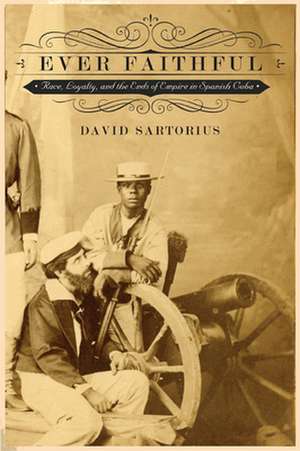Ever Faithful – Race, Loyalty, and the Ends of Empire in Spanish Cuba
Autor David Sartoriusen Limba Engleză Paperback – 9 ian 2014
| Toate formatele și edițiile | Preț | Express |
|---|---|---|
| Paperback (1) | 264.26 lei 43-57 zile | |
| MD – Duke University Press – 9 ian 2014 | 264.26 lei 43-57 zile | |
| Hardback (1) | 777.97 lei 43-57 zile | |
| MD – Duke University Press – 9 ian 2014 | 777.97 lei 43-57 zile |
Preț: 264.26 lei
Nou
Puncte Express: 396
Preț estimativ în valută:
50.57€ • 52.60$ • 41.75£
50.57€ • 52.60$ • 41.75£
Carte tipărită la comandă
Livrare economică 14-28 aprilie
Preluare comenzi: 021 569.72.76
Specificații
ISBN-13: 9780822355939
ISBN-10: 0822355930
Pagini: 336
Ilustrații: 12 photographs, 1 map
Dimensiuni: 154 x 230 x 20 mm
Greutate: 0.45 kg
Editura: MD – Duke University Press
ISBN-10: 0822355930
Pagini: 336
Ilustrații: 12 photographs, 1 map
Dimensiuni: 154 x 230 x 20 mm
Greutate: 0.45 kg
Editura: MD – Duke University Press
Recenzii
"Ever Faithful is an important book. Rather than add to the copious scholarship explaining how Cubans came to reject colonial rule, David Sartorius asks why so many remained loyal to Spain. Exploring how loyalty worked in practice, he focuses on people of color, whose allegiances were watched closely by both imperial and nationalist leaders. He offers an original and convincing thesis: that the history of loyalty explains as much or more about Cuban racial politics than does the history of revolution and independence."Vincent Brown, author of The Reapers Garden: Death and Power in the World of Atlantic Slavery"David Sartorius illuminates and complicates Cuban history from 1808 to 1898, focusing on loyalty to Spain to understand enduring colonial rule, the expansion and end of slavery, and a late and limited independence. Diverse Cubans negotiated Spanish citizenship. In a complex racial politics, opposition to empire and to slavery often divergedprolonging both. Ever Faithful begins an essential rethinking of empire and citizenship, race and resistance in Cubawith powerful implications for Brazil and the U.S."John Tutino, author of Making a New World: Founding Capitalism in the Bajío and Spanish North America
"Ever Faithful is an important book. Rather than add to the copious scholarship explaining how Cubans came to reject colonial rule, David Sartorius asks why so many remained loyal to Spain. Exploring how loyalty worked in practice, he focuses on people of color, whose allegiances were watched closely by both imperial and nationalist leaders. He offers an original and convincing thesis: that the history of loyalty explains as much or more about Cuban racial politics than does the history of revolution and independence." - Vincent Brown, author of The Reaper's Garden: Death and Power in the World of Atlantic Slavery "David Sartorius illuminates and complicates Cuban history from 1808 to 1898, focusing on loyalty to Spain to understand enduring colonial rule, the expansion and end of slavery, and a late and limited independence. Diverse Cubans negotiated Spanish citizenship. In a complex racial politics, opposition to empire and to slavery often diverged - prolonging both. Ever Faithful begins an essential rethinking of empire and citizenship, race and resistance in Cuba - with powerful implications for Brazil and the U.S." - John Tutino, author of Making a New World: Founding Capitalism in the Bajio and Spanish North America
"Ever Faithful is an important book. Rather than add to the copious scholarship explaining how Cubans came to reject colonial rule, David Sartorius asks why so many remained loyal to Spain. Exploring how loyalty worked in practice, he focuses on people of color, whose allegiances were watched closely by both imperial and nationalist leaders. He offers an original and convincing thesis: that the history of loyalty explains as much or more about Cuban racial politics than does the history of revolution and independence." - Vincent Brown, author of The Reaper's Garden: Death and Power in the World of Atlantic Slavery "David Sartorius illuminates and complicates Cuban history from 1808 to 1898, focusing on loyalty to Spain to understand enduring colonial rule, the expansion and end of slavery, and a late and limited independence. Diverse Cubans negotiated Spanish citizenship. In a complex racial politics, opposition to empire and to slavery often diverged - prolonging both. Ever Faithful begins an essential rethinking of empire and citizenship, race and resistance in Cuba - with powerful implications for Brazil and the U.S." - John Tutino, author of Making a New World: Founding Capitalism in the Bajio and Spanish North America
Cuprins
Preface vii
Acknowledgments xv
Introduction. A Faithful Account of Colonial Racial Politics 1
1. Belonging to an Empire: Race and Rights 21
2. Suspicious Affinities: Loyal Subjectivity and the Paternalist Public 52
3. The Will to Freedom: Spanish Allegiances in the Ten Years' War 94
4. Publicizing Loyalty: Race and the Post-Zanjón Public Sphere 128
5. "Long Live Spain! Death to Autonomy!": Liberalism and Slave Emancipation 158
6. The Price of Integrity: Limited Loyalties in Revolution 187
Conclusion. Subject Citizens and the Tragedy of Loyalty 217
Notes 227
Bibliography 271
Index
Acknowledgments xv
Introduction. A Faithful Account of Colonial Racial Politics 1
1. Belonging to an Empire: Race and Rights 21
2. Suspicious Affinities: Loyal Subjectivity and the Paternalist Public 52
3. The Will to Freedom: Spanish Allegiances in the Ten Years' War 94
4. Publicizing Loyalty: Race and the Post-Zanjón Public Sphere 128
5. "Long Live Spain! Death to Autonomy!": Liberalism and Slave Emancipation 158
6. The Price of Integrity: Limited Loyalties in Revolution 187
Conclusion. Subject Citizens and the Tragedy of Loyalty 217
Notes 227
Bibliography 271
Index












